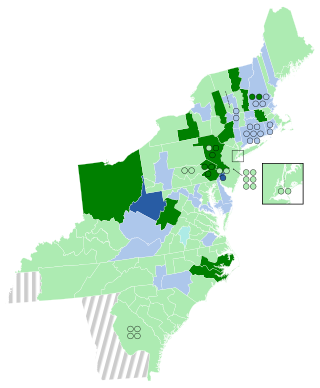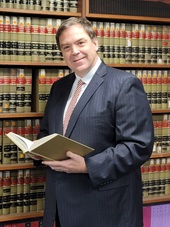Related Research Articles

Increase Sumner was an American lawyer, jurist, and politician from Massachusetts. He was the fifth governor of Massachusetts, serving from 1797 to 1799. Trained as a lawyer, he served in the provisional government of Massachusetts during the American Revolutionary War, and was elected to the Confederation Congress in 1782. Appointed to the Massachusetts Supreme Judicial Court the same year, he served there as an associate justice until 1797.

The 1810–11 United States House of Representatives elections were held on various dates in various states between April 24, 1810 and August 2, 1811. Each state set its own date for its elections to the House of Representatives before the first session of the 12th United States Congress convened on November 4, 1811. They occurred during President James Madison's first term. Elections were held for all 142 seats, representing 17 states.

The 1798–99 United States House of Representatives elections were held on various dates in various states between April 24, 1798 in New York and August 1, 1799 in Tennessee. Each state set its own date for its elections to the House of Representatives, with some after the official start of the 6th United States Congress on March 4, 1799, but before the start of the first session of this Congress in Philadelphia on December 2, 1799. These elections were held during President John Adams term. It was the last congressional session before the move to the new capital at Washington, D.C. Elections were held for all 106 seats, representing 16 states.

The 1796–97 United States House of Representatives elections took place in the various states took place between August 12, 1796, and October 15, 1797. Each state set its own date for its elections to the House of Representatives. The size of the House increased to 106 seats after Tennessee became the 16th state to join the union. The first session of the 5th United States Congress was convened on May 15, 1797, at the proclamation of the new President of the United States, John Adams. Since Kentucky and Tennessee had not yet voted, they were unrepresented until the second session began on November 13, 1797.

The first 1798 United States Senate special election in New York was held on January 11, 1798, by the New York State Legislature to elect a U.S. Senator to represent the State of New York in the United States Senate.

The 1808–09 United States Senate elections were held on various dates in various states, coinciding with the 1808 presidential election. As these U.S. Senate elections were prior to the ratification of the Seventeenth Amendment in 1913, senators were chosen by state legislatures. Senators were elected over a wide range of time throughout 1808 and 1809, and a seat may have been filled months late or remained vacant due to legislative deadlock. In these elections, terms were up for the senators in Class 1.

The 1798–99 United States Senate elections were held on various dates in various states. As these U.S. Senate elections were prior to the ratification of the Seventeenth Amendment in 1913, senators were chosen by state legislatures. Senators were elected over a wide range of time throughout 1798 and 1799, and a seat may have been filled months late or remained vacant due to legislative deadlock. In these elections, terms were up for the senators in Class 2.

The 1796–97 United States Senate elections were held on various dates in various states. As these U.S. Senate elections were prior to the ratification of the Seventeenth Amendment in 1913, senators were chosen by state legislatures. Senators were elected over a wide range of time throughout 1796 and 1797, and a seat may have been filled months late or remained vacant due to legislative deadlock. In these elections, terms were up for the senators in Class 1.

The 1800 United States House of Representatives elections in New York were held from April 29 to May 1, 1800, to elect ten U.S. Representatives to represent the State of New York in the United States House of Representatives of the 7th United States Congress.

Elections to the United States House of Representatives were held in Pennsylvania on October 11, 1796, for the 5th Congress.

A special election was held in Pennsylvania's 5th congressional district on October 11, 1796 to fill a vacancy caused by the resignation of Daniel Hiester (DR) on July 1, 1796

A special election was held in Pennsylvania's 5th congressional district on October 10, 1797 to fill a vacancy caused by the resignation of George Ege (F).

A special election was held in Pennsylvania's 4th congressional district was held on October 9, 1798 to fill a vacancy left by the resignation of Samuel Sitgreaves (F), who'd been appointed commissioner to Great Britain under the Jay Treaty. The election was held on the same day as elections to the 6th Congress.
A special election was held in Massachusetts's 1st congressional district on September 5, 1796 and November 21, 1796 to fill a vacancy caused by the resignation of Theodore Sedgwick (F) upon his election to the Senate
A special election was held in Rhode Island's at-large congressional district on August 29, 1797 to fill a vacancy left by the resignation of Elisha R. Potter (F) shortly after the end of the 1st session of the 5th Congress.
A special election was held in Massachusetts's 4th congressional district August 24, 1801 to fill a vacancy caused by the resignation of Levi Lincoln Sr. (DR) on March 5, 1801, before the first session of Congress, upon being appointed U.S. Attorney General.

Jeffrey Rosario Turco is an American attorney, politician, and former law enforcement officer serving as a member of the Massachusetts House of Representatives from the 19th Suffolk district. He was elected in a March 30, 2021, special election.